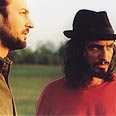
God and I
New film asks divine questions as it searches the big issues; Mel Gibson threatened by movie's 'theology'
Pointing the camera upward - A documentary film made on the set of “The Passion of Christ” which ponders the essence of God was almost confiscated by Mel Gibson.
“Gibson liked the film artistically,” said the director, “but theologically it made him uncomfortable”
What is God? Are religion and faith the same thing?
“The Big Question,” which will be screened on Wednesday at the Tel Aviv Cinemateque in the presence of Cabras, raised the biggest question of all.
The film’s creators asked permission from actor, director and producer Mel Gibson, to make their movie on the set of “The Passion of Christ."
Both Cabras and Molinari had small roles in Gibson’s film. For their documentary they interviewed the actors, extras, crew and production staff about faith. The result is a fascinating microcosm, philosophic, cheerful and thought provoking.
Cinematic work
Despite the subject, the film is not religious but a cinematic creation aimed equally at believers and atheists and those looking for meaning.
“We are all searching for answer. How could we not?” said Cabras in an interview with Ynet.
Cabras, a Catholic who went to parochial schools and in the shadow of the church does not define himself as a believer in the religious sense: “I never thought I’d find answers during the making of the film, because life is not built like that. I did think this was a useful way to continue delving into the subject. It sounds simplistic, but the answers are found in the approach, in the questions, in the path that is taken.”
“When I was selected for a part in ‘The Passion of Christ' I thought that anchoring our film in this microcosm may be an excellent idea. It was logical to pose these questions on the set of a film that deals with the most popular prophet in our history,” said Cabras.
The big question
The “Big Question” differs from most documentaries in the way it was shot and edited.
“It’s a film based on interviews and a lot of ‘talking heads,' a style more prevalent on television than in film. We wanted to find the balance between the meaning, the content and the form, through the fabulous character in the faces of the people, the great costumes and the unbelievable beauty of the location which exceeded anyone’s imagination.”
Religion and liberalism often conflict. Cabras knows that well as someone who had a religious upbringing. It was also made clear to him during the filming of the documentary that one person’s faith is likely to threaten someone else’s.
“Mel Gibson permitted us to make our film on his set after he saw examples of some of our other work,” said Cabras. “He was very complimentary and even offered the services of his production company Icon.
"We were in Seventh Heaven. We filmed for months, edited, added an original soundtrack of music and when the film was almost ready, we went to Los Angeles to show Gibson the finished product. After the filming he said he liked it, and we believed him. His people told us that they would look after the marketing and public relations for the film.
"Two weeks later, “The Passion of Christ” debuted and the hysteria was at its peak. We tried to connect with the producers who vanished and so did our film. We did not know what happened. When we reestablished contact, they apologized and said they were swamped because of “The Passion."
"Only afterwards did we find out the surrealistic truth. Gibson loved the film artistically and even called it a masterpiece. But theologically it made him uncomfortable. He did not want the film to be seen."










